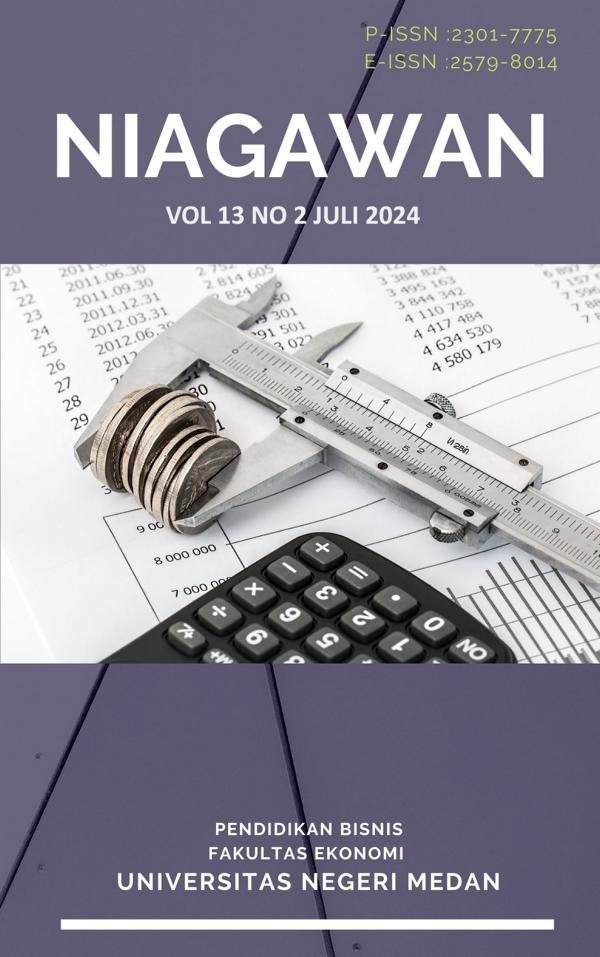PENGARUH BERBAGI PENGETAHUAN DAN PERILAKU INOVATIF TERHADAP INOVASI TIM DI LEMBAGA KEUANGAN MIKRO
DOI:
https://doi.org/10.24114/niaga.v13i2.60081Keywords:
Knowledge Sharing, Innovative Behavior, TeamInnovationAbstract
Team innovation in microfinance institutions lies in the quality of human resources. The rapidly changing times that occur must be able to be anticipated with quality innovation. The quality of human resources can be seen from the ability of employees to share knowledge and behave innovatively and can be assessed from the team innovation that occurs in the institution or organization. The population of this research is employees who work in the microfinance industry with a population of 2100. A sample of 300 employees was taken using the proportional stratified random sampling method. The data collection technique is by distributing questionnaires to all respondents. The data analysis method used is SEM (Structural Equation Modeling), with the Smart PLS program. This team's innovation concept will provide insight and guidance for employees to be able to increase the competitiveness and existence of Microfinance Institutions now and in the future.References
Amari, I.N., Dewayani, J.,&Ferdinand, A. T. (2019). Strategic Human Resources Roles and Knowledge Sharinh: How do Enhancing Organizational Innovation? Quality Access to Succes, 20(168), 8.
Ardiansyah, (2011). Manajemen Sumber Daya Manusia. Edisi kesepuluh PT. Indeks, Jakarta
Armenakis, A. A., Bernerth, J. B., Pitts, J.P., & Walker, H.J. (2007). Organizational change reccepient™s belief scale: Development of an assessment instrument. The Journal of Applied Behavioral Science, 43(4).
Armenakis, A A., harris, S., & Mossholder, K. W. (1993). Creating readiness for organizationak change. Human Relations, 46(6).
Aulawi, Govindaraju, Suryadi, &Sudirman. Hubungan Knowledge Sharing Behavior Dan Individual Innovation Capability. Bandung: Institute Teknologi Bandung. 2009
Bock, G.-W., Zmud, R. W., Kim, Y.-G., & Lee, J.-N. (2005). Behavioral Intention Formation in Knowledge Sharing: Examining the Roles of Extrinsic Motivators, Social-Psychological Forces, and Organizational Climate. MIS Quarterly, 29(1), 87-111.
Casey, M. M., Payne, W. R., & Eime, R. M. (2012). Organisational readiness and capacity building strategies of sporting organisations to promote health. Sport Management Review, 15(1), 109-124. doi:10.1016/j.smr.2011.01.001.
De Silva, M., Howells, J., & Meyer, M. (2018). Innovation intermediaries and collaboration: Knowledge“based practices and internal value creation. Research Policy, 47(1), 70-87. doi:10.1016/j.respol.2017.09.011
Ferdinand, Augusty, (2014). Metode Penelitian Manajemen, Podoman Penelitian Skripsi, Tesis, dan Desertas Ilmu Manajemen, Edisi kelima BP-UNDIP, Semarang
Kreitner, Robert dan Angelo Kinichi., (2003). Perilaku Organisasi, Buku 2, Edisi Kelima, Penerjemah: Erly Suandy, Penerbit Salemba Empat, Jakarta.
Laporan Industri Perbankan Triwulan I 2021, website OJK.
Lee, Y.-H., Lu, T.-E., Yang, C. C., & Chang, G. (2019). A multilevel approach on empowering leadership and safety behavior in the medical industry: The mediating effects of knowledge sharing and safety climate. Safety Science, 117, 1-9. doi:10.1016/j.ssci.2019.03.022.
Lin, Hsiu-Fen. Knowledge sharing and firm innovation capability: an empirical study. International Journal of Manpower. Vol. 28 No. 3/4. pp. 315-332. 2007.
Lund. B, Daulatram (2003). Organizational and Job Satisfaction, Jornal of Bussines and Industrial Marketing, 11, 2/3; ProQuest, Pg 219.
Maria, V. (2011). What's in there for me? Individual readiness to change and the perceived impact of organizational change. Leadership & Organization Development Journal, 35(3), 195-209. Retrieved from http://dx.doi.org/10.1108/LODJ-05-2012-0064. doi:10.1108/LODJ-05-2012-0064.
Muhammad Shahnawaz, A. (2016). Impact of change readines s on commitment to technological change, focal, and discretionary behaviors: Evidence from the manufacturing sector of Karachi. Journal of Organizational Change Management, 29(2), 222-241. Retrieved from http://dx.doi.org/10.1108/JOCM-11-2014-0198. doi:10.1108/JOCM-11-2014-0198.
McGrath, G. R., & MacMillan, I. C. (2000). Entrepreneurial Mindset: Strategies for Continuously Creating Opportunity in an Age of Uncertainty. Harvard Business School Press Books.
Mangkunegara, A.A. Anwar Prabu., (2007). Manajemen Sumber Daya Manusia Perusahaan, Cetakan Ketujuh, Penerbit PT. Remaja Rosdakarya, Bandung.
Mas™ud, Fuad., (2004). Survei Diagnosis Organisasiaonal : Konsep dan Aplikasi. Banan Penerbit Universitas Diponegoro, Semarang.
Sugiyono, (2009). Metode Penelitian Bisnis, Cetakan Kesembilan, Penerbit CV. Alfabeta, Bandung.
Suliyanto, (2018). Metode Penelitian Bisnis untuk Skripsi, Tesis, & Disertasi Penerbit Rineka Cipta, Poerwokerto.
Srivastava, A., Bartol, K. M., & Locke, E. A. (2006). Empowering Leadership in Management Teams Effects on Knowledge Sharing, Efficacy, And Performance. Academy of Management Journal, 49( 6), 1239-1251.
Wulandari, F., Ferdinand, A. T., & Dwiatmadja, C. (2018). Knowledge Sharing in a Critical Moment of Work. International Journal of Knowledge Management, 14(2), 88-98. doi:10.4018/ijkm.2018040106.
Downloads
Published
Issue
Section
License
Authors who publish in this journal agree to the following terms:
- Authors retain copyright and grant the journal the right of first publication, with the work simultaneously licensed under a Creative Commons Attribution License that allows others to share and adapt the work with an acknowledgment of the work's authorship and initial publication in this journal.
- Authors can enter into separate, additional contractual arrangements for the non-exclusive distribution of the journal's published version of the work, with an acknowledgment of its initial publication in this journal.
- Authors are permitted and encouraged to post their work online before and during the submission process, as it can lead to productive exchanges and earlier and greater citation of published work. Where authors include such work in an institutional repository or on their website, we request that they include a statement acknowledging the Jurnal Perspektif Pembiayaan dan Pembangunan Daerah, including the name of the journal, the volume number, and a web link to the journal item.
- Authors should be aware that the Creative Commons Attribution 4.0 International License (CC BY 4.0) permits readers to share (copy and redistribute the work in any medium or format) and adapt (remix, transform, and build upon the work) for any purpose, even commercially, provided they also give appropriate credit to the work, provide a link to the license, and indicate if changes were made. They may do these things reasonably but not in any way that suggests the author or the publisher endorses their use.
NIAGAWAN by Program Studi Pendidikan Bisnis Fakultas Ekonomi Universitas Negeri Medan is licensed under CC BY-NC 4.0

